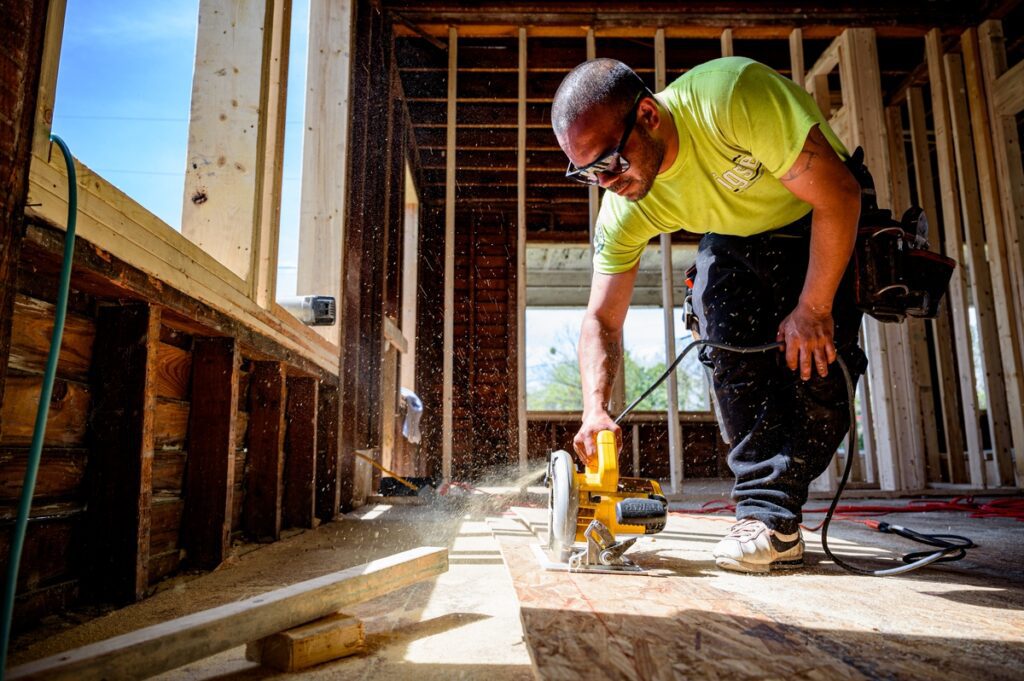Discover why carpentry isn’t just a job, but a rewarding career path that combines traditional craftsmanship with modern opportunities and growing demand.
The Current State of Carpentry Careers
The carpentry industry in the UK has undergone significant transformation in recent years, evolving from traditional woodworking practices to incorporating cutting-edge technology and sustainable building methods. As of 2024, the sector is experiencing robust growth, driven by increased construction activity, renovation projects, and a growing emphasis on bespoke, high-quality craftsmanship. Modern carpenters are finding themselves at the intersection of time-honoured skills and innovative techniques, with opportunities spanning residential construction, commercial projects, and specialized custom work. The implementation of Building Information Modelling (BIM) and sustainable building practices has created new niches for skilled carpenters who can adapt to changing industry demands.
Industry Demand and Growth Projections
The UK construction industry is experiencing a significant skills shortage, with carpentry being one of the most in-demand trades. Recent studies indicate that the demand for qualified carpenters is expected to grow by 12% through 2033. This growth is fueled by several factors:
- Government initiatives to build 300,000 new homes annually
- Increased focus on sustainable building practices
- Rising demand for bespoke furniture and custom installations
- Growing renovation and home improvement sector
- Commercial construction projects across the UK
Salary Potential and Career Progression
Carpentry offers attractive earning potential, particularly for skilled professionals. Entry-level carpenters in the UK typically start at £25,000-£30,000 annually, with experienced carpenters earning £40,000-£60,000. Master carpenters and those running their own businesses can earn upwards of £80,000 per year. Career progression opportunities include:
- Site Supervisor or Project Manager roles (£45,000-£65,000)
- Specialist heritage carpenter positions (£40,000-£70,000)
- Construction Manager roles (£50,000-£80,000)
- Independent business ownership (potential for six-figure earnings)
Key Benefits of Choosing Carpentry as a Career
Financial Advantages
One of the most compelling aspects of pursuing a carpentry career is the financial benefit structure. Unlike many professional paths requiring expensive university degrees, carpentry training often follows an apprenticeship model, allowing you to earn while you learn. The average apprentice carpenter starts at £8-£12 per hour, with wages increasing substantially as skills develop. Additionally, qualified carpenters can benefit from:
- Minimal or no student debt
- Regular overtime opportunities
- Performance-based bonuses
- Tool allowances and benefits packages
- Potential for self-employment and business ownership
Professional Satisfaction
Carpentry offers unique professional satisfaction that few other careers can match. The ability to see tangible results of your work, create lasting structures, and contribute to the built environment provides a sense of accomplishment and pride. Carpenters report high job satisfaction levels, citing factors such as:
- Creative expression through craftsmanship
- Variety in daily tasks and projects
- Visible impact on communities and spaces
- Problem-solving opportunities
- Legacy creation through lasting work
Career Flexibility
Modern carpentry careers offer remarkable flexibility in terms of specialisation and work environment. Professionals can choose from various paths and adapt their careers as interests and market demands evolve.
Modern Carpentry: Beyond Traditional Skills
Technology Integration
Today’s carpenters are increasingly working with advanced technology, enhancing their traditional skillset with digital tools. The integration of technology has improved precision, efficiency, and project planning capabilities. Key technological advances include:
- Computer-Aided Design (CAD) software
- Digital measuring and cutting tools
- 3D modeling and visualization
- Project management software
- Automated cutting and manufacturing systems
Sustainable Building Practices
Environmental consciousness has become central to modern carpentry, with sustainable practices increasingly in demand. This shift has created new opportunities and responsibilities for carpenters, including:
- Working with eco-friendly materials
- Implementing energy-efficient design principles
- Understanding green building certifications
- Recycling and waste reduction techniques
Challenges and Considerations
Physical Demands
While rewarding, carpentry is physically demanding work that requires consideration of:
- Regular heavy lifting and physical exertion
- Extended periods of standing, kneeling, and climbing
- Weather exposure on outdoor projects
- Need for proper safety equipment and practices
- Importance of maintaining physical fitness
Work Environment Variables
Carpenters must adapt to various working conditions and challenges, including seasonal fluctuations in work availability and diverse project environments. Understanding these variables is crucial for career planning and stability.
Getting Started in Carpentry
Training and Certification Paths
The path to becoming a qualified carpenter in the UK typically involves:
- Level 2/3 Diploma in Carpentry and Joinery
- Apprenticeship programmes (2-4 years)
- NVQ qualifications
- Health and safety certifications
- Continuous professional development
Essential Skills and Qualities
Success in carpentry requires a combination of technical and soft skills:
- Mathematical ability and spatial awareness
- Manual dexterity and hand-eye coordination
- Problem-solving capabilities
- Attention to detail
- Communication and customer service skills
Future-Proofing Your Carpentry Career
Emerging Opportunities
The future of carpentry offers exciting prospects in emerging sectors:
- Sustainable construction projects
- Heritage restoration work
- Modern manufacturing facilities
- Custom furniture design
- Specialized installations
Continuous Professional Development
Staying competitive in modern carpentry requires ongoing learning and adaptation to new technologies and techniques. Successful carpenters regularly update their skills through training courses, workshops, and industry certifications.
Making Your Decision
Choosing carpentry as a career offers a unique combination of traditional craftsmanship, modern technology, and sustainable practices. With strong job prospects, competitive salaries, and various specialization options, it presents an excellent opportunity for those seeking a rewarding, hands-on profession. The key to success lies in committing to continuous learning, maintaining physical fitness, and staying adaptable to industry changes. For those passionate about creating and building, carpentry offers a fulfilling career path with tangible results and lasting impact.
FAQ
Is it worth becoming a carpenter?
Carpenters can work in many settings, from massive construction sites to residential home improvement projects. It takes time for carpenters to hone their skills, but for those who put in the effort, it’s a worthwhile journey and a rewarding career.
Sources
[1] https://www.workyard.com/construction-management/carpentry-industry-trends
[2] https://www.byf.org/top-5-reasons-to-become-a-carpenter/
[3] https://author.allegisgroup.com/en/insights/is-carpentry-a-good-career



